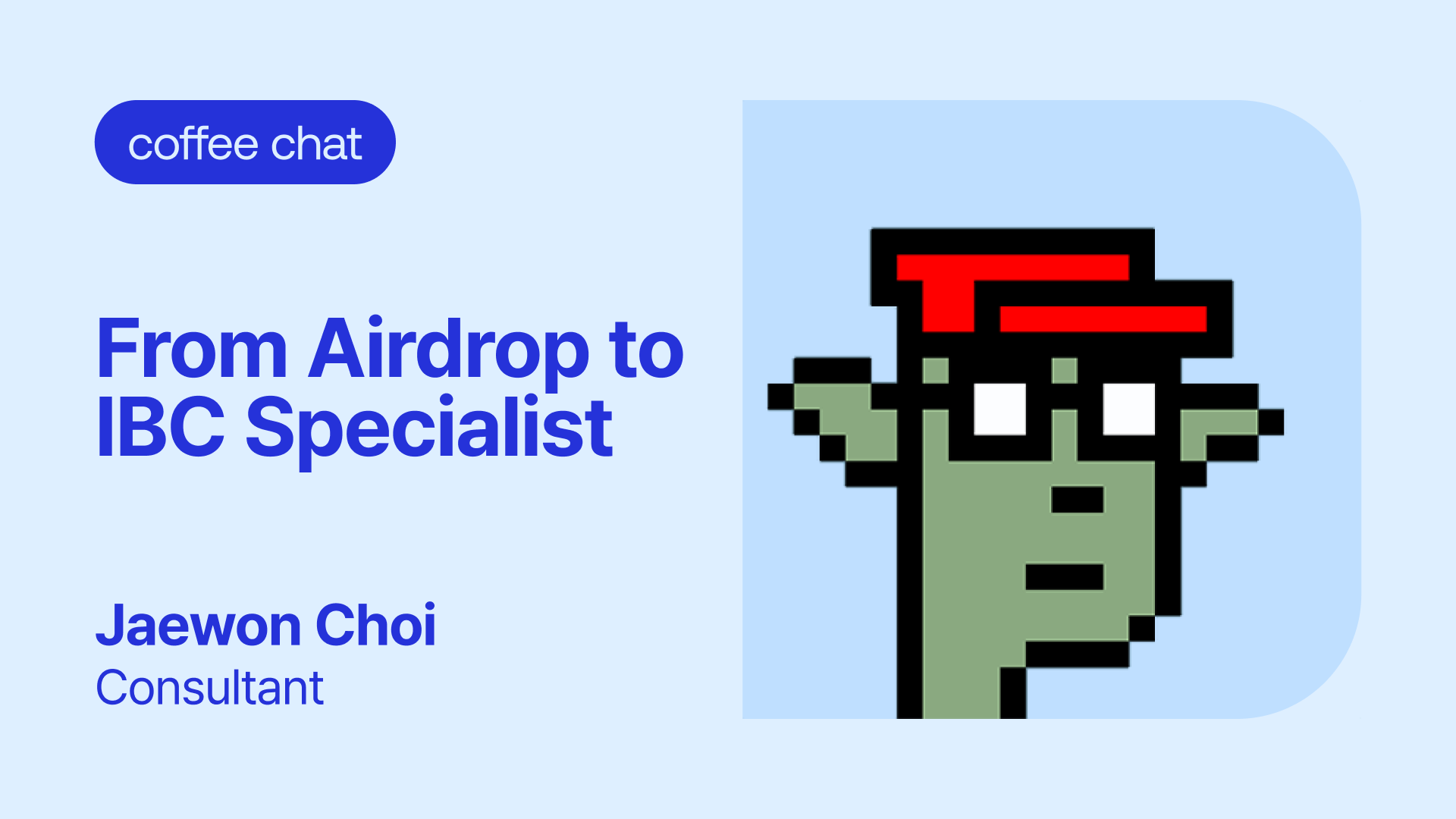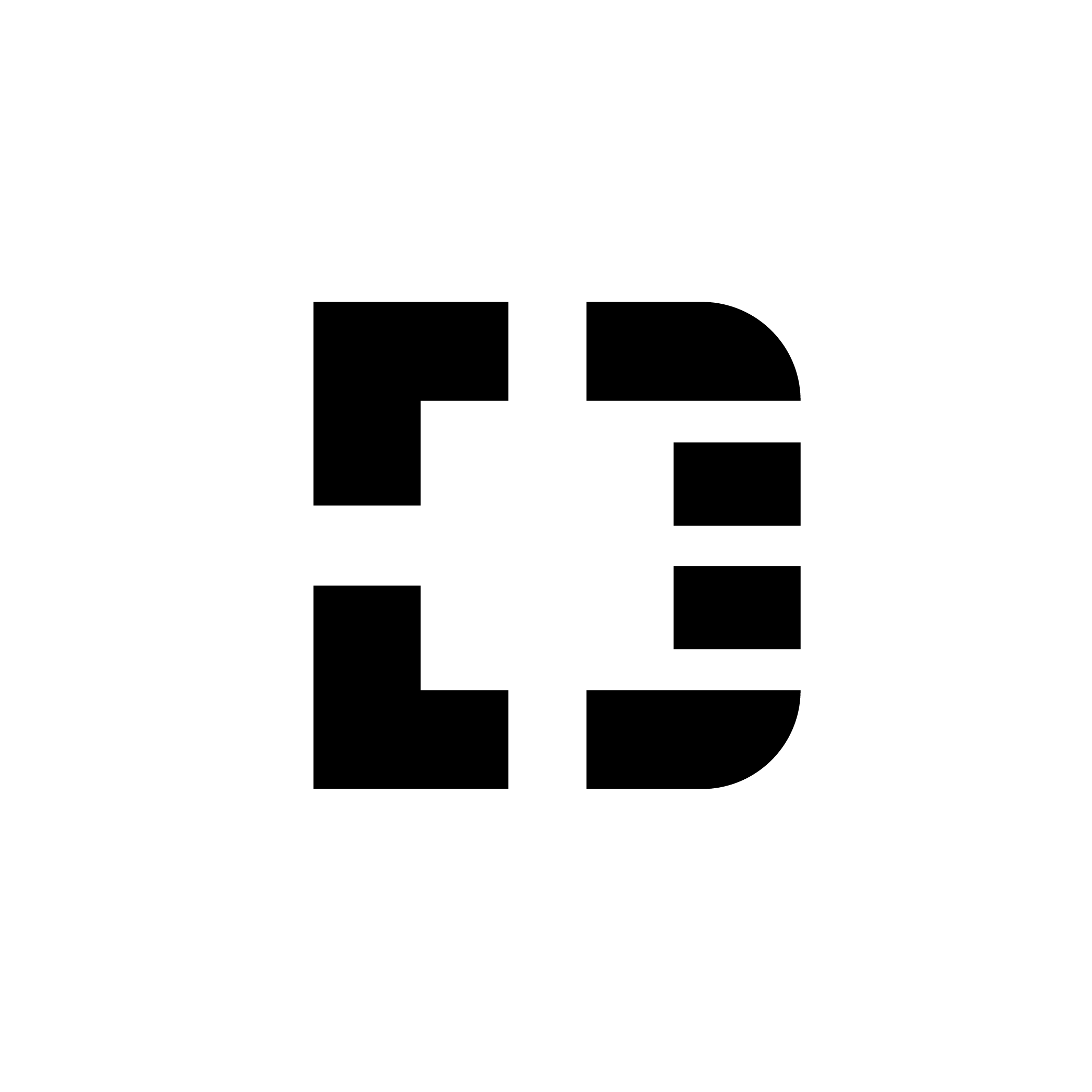
A Coffee Chat With D’s Friends I Jaewon Choi / Consultant
This time, We had a conversation with Jaewon Choi about how he became fascinated by IBC, which he now identifies with, and the story behind running his personal channel, Coblin’s IBC Training Battalion, for over three years.
Starting with Airdrops, the Journey to Becoming an IBC Specialist
**Disclaimer) The opinions expressed in this interview are those of the interviewer and do not represent the official statement of DeSpread.
Hello, I’m Eunji Cho at DeSpread. DeSpread is a company of “Degens” who are immersed in the Web 3 industry. Each of our team members has a unique personality, but we share the same DNA: a genuine love for Web 3. We work in a free-spirited atmosphere, but we’re all professionals in our respective fields.
In the last edition of D’s Friends and Coffee Chat, we interviewed Jun Park, the content management lead at DeSpread. This time, We had a conversation with Jaewon Choi about how he became fascinated by IBC, which he now identifies with, and the story behind running his personal channel, Coblin’s IBC Training Battalion, for over three years.
Jaewon leverages his deep understanding of the Web3 market and IBC ecosystem, built from managing his personal channel, to serve as a consultant at DeSpread. In this edition, we’ll explore Jaewon’s efforts to resolve information asymmetry in the Web3 market and delve into the intrinsic value of blockchain.
** IBC (Inter Blockchain Communication): A protocol that enables interoperability between blockchains. Traditional blockchains recognize only the information generated within their own chains, ensuring strong security but creating fragmentation and liquidity issues as the number of chains grows. IBC was developed to address these shortcomings and not only provides bridge services but also supports interactions between smart contracts.

Eunji: Could you briefly introduce yourself?
“My name is Jaewon Choi, and I work as a consultant and project manager (PM) at DeSpread. In the Web3 community, I go by the name ‘Coblin,’ and I also run a personal channel where I share information about IBC.”
Eunji: How did you get involved in Web3?
“I got into the industry naturally through my interest in investments.
In 2021, there was the so-called ‘GameStop event,’ where the stock of the American game company GameStop skyrocketed. At that time, I was very interested in investments, so I invested in GameStop. That was when I started to get seriously into investing, and I began hearing about how ‘crypto assets’ were becoming popular among investors.
Later, I began investing in crypto assets, but a friend told me that crypto wasn’t just an investment tool. This friend worked in the blockchain (or Web3) industry, and through them, I got to try something called ‘airdrop farming.’
An airdrop is when a project distributes its tokens for free to users who have contributed to their network or DApp activity at the time of the token launch. Airdrop farming is when users try to figure out the airdrop criteria and leave transactions in DApps to qualify. I found this process interesting, particularly on the decentralized exchange (DEX) dYdX, and that’s how I naturally entered this industry.”
Eunji: What were you doing before you joined DeSpread?
“Before entering the industry, I worked as a social worker. At the time, there were many incidents that eroded trust in social welfare organizations, and I thought blockchain could be a solution. Blockchain allows individuals to access certain information, so public institutions could gain trust by transparently disclosing how they spend their budgets.
After officially entering the industry, I built my career by managing projects at a blockchain consulting firm. I also created my personal brand through my channel, Coblin’s IBC Training Battalion, where I consistently deliver news about the IBC ecosystem.”
Eunji: What made you choose DeSpread?
“I had collaborated with DeSpread as a freelancer before joining and noticed that it stood out from other Web3 companies.
Among the team members, some prefer the A ecosystem, others the B ecosystem—there is no bias toward a specific area or chain. Each team member brings diverse perspectives, which collectively enriches DeSpread with specialized knowledge across various ecosystems.
Since I like the IBC ecosystem, I sometimes get too immersed in it and miss the broader industry trends. I thought being part of DeSpread would help me broaden my perspective through the insights of my colleagues.
Then DeSpread made me an offer to join, and I became part of the team.”
Eunji: What do you do at DeSpread?
“I help various projects create localized strategies for the Korean market. I assist overseas projects that lack an understanding of the Korean market to successfully enter it. I also relay product updates from these projects to the Korean market.”
Eunji: You run a personal community called ‘Coblin’s IBC Training Battalion.’ The concept seems unique. Could you give us a brief introduction to the community?
“In my personal channel, I mainly focus on the IBC ecosystem. Many people think the name ‘Coblin’ is a combination of ‘Cosmos’ and ‘Goblin,’ but my original intention was ‘Coin + Goblin.’ In the early days of the channel, I covered various news about coins (crypto assets), but now I only focus on Cosmos, so that’s likely why people associate it with Cosmos.
I chose the Goblin character because in games, movies, and comics, Goblins are often depicted as a species obsessed with greed and money. In games like Diablo, there’s a ‘Golden Goblin’ or ‘Treasure Goblin,’ and if you catch them, you can get a lot of items or resources. As the channel operator, I wanted to convey the idea that if you follow me, you’ll receive valuable information, which is why I chose the Goblin as the main character.
The word ‘Training Battalion’ reflects the meme-like trend of using commanding tones. When I first started the channel, there was a meme around airdrops where people would say things like ‘Do this airdrop,’ ‘Claim here,’ in a commanding way. So I adopted the concept of a ‘training’ channel and named it ‘Training Battalion.’”

Eunji: What made you become so interested in the IBC ecosystem?
“As I mentioned earlier, after experiencing the dYdX airdrop, I started looking for other projects or ecosystems that offered airdrops. That's when I learned that by staking ATOM (Cosmos), new projects based on the Cosmos network would distribute airdrops whenever they launched. So, I began staking ATOM and got deeper into the ecosystem, wanting to share this information with others.
Initially, I was just interested in the airdrops, but over time, I became fascinated by the technical aspects, like the SDK (Cosmos Software Development Kit), and governance issues within the Cosmos ecosystem.”
Eunji: What do you think are the advantages of IBC compared to other interchain ecosystems?
“The biggest advantage is that developers can create a wide variety of products using the SDK, and it’s an environment where you can easily create new blockchains. This makes it an ideal setting for developing products beyond just DeFi (DeFi+), allowing for something new to emerge within the IBC ecosystem.
Another advantage is that over 80 blockchains interact with each other through IBC, which creates synergies. There’s a site called Map of Zones, a Cosmos explorer that visualizes all the blockchains connected through IBC, so I recommend checking it out to see the interactions visually.
Compared to other interchain ecosystems, IBC’s community naturally formed through airdrops, which I think is another advantage. Some projects try to force people to use tokens to bring them into the community, but with IBC, the process felt more organic.”
Eunji: What’s the secret behind running your personal channel consistently for over three years?
“At first, I started with the intention of organizing my thoughts and spreading the information little by little, but I was amazed to see people gradually gather. Initially, I thought most people wouldn’t be interested in blockchain, and I wondered, 'Why are they seeking out this information?’ But it turned out that people interested in the blockchain ecosystem were actually joining my channel.
That’s when I started to really work on improving the quality of the information and posting diligently. This effort created a positive cycle where new members would join.
Of course, it wasn’t just my hard work. People who were genuinely passionate about the IBC ecosystem also found their way to my channel, and the community grew around ecosystem-centered discussions, which contributed to creating an atmosphere of open debate. I found that rewarding.”
Eunji: I’ve noticed that there are a lot of Korean players in the Cosmos ecosystem. Why do you think that is?
“Before ICOs (Initial Coin Offerings) were banned in Korea in 2017, the ATOM ICO was conducted on the cryptocurrency exchange Coinone. I believe the total public sale volume of ATOM was 160 million ATOMs, and I remember the Coinone ICO had 100 million ATOMs, which is a huge amount.
Because such a large portion of the public sale was released in Korea, a significant number of people in Korea ended up holding ATOM. Later, in the Korean Cosmos ecosystem, there was a growing opinion that running a validator would be more advantageous because so many people held ATOM. As a result, a lot of Korean-based validators started to emerge. I think this environment is why we see so many Korean players.”
Eunji: There have been instances in the past, like the split between Jae Kwon and the ICF Foundation or Proposal 82, which caused the community to divide. Did these events lead to any changes in the ecosystem’s atmosphere?
“I think the fact that these kinds of debates can happen is one of Cosmos’s strengths. In the end, such divisions can be seen as interactions between individuals within the Cosmos ecosystem who have different interests. In other blockchain ecosystems, key individuals often played a major role, and their opinions were generally accepted.
However, in Cosmos, even though major groups like the ICF proposed something like ‘ATOM 2.0,’ some community members expressed concerns about the risks and voiced opposition. This opposition didn’t signify the failure of ATOM 2.0. Rather, it showed that various attempts and improvements are underway to advance the blockchain.
Even though the ATOM 2.0 governance proposal didn’t pass, it doesn’t mean that the users who rejected it were against reform itself. It seemed that they were concerned about the side effects of implementing radical changes to governance. As a result, elements of the ATOM 2.0 reforms are being reflected through a more detailed governance process.
Additionally, Jae Kwon, one of Cosmos’s co-founders who opposed ATOM 2.0, is building the blockchain he envisions through his projects GnoLand and Atom One, a Cosmos Hub hard fork. This also demonstrates the decentralized nature of the Cosmos Hub.
I think this is an example of embodying the spirit of blockchain. Even though Cosmos might be slower than other blockchains or have less impressive price performance, it still delivers meaningful results.”

Eunji: What is the current hot topic in the IBC ecosystem?
“I think the recent issue is the Neutron-based restaking protocol ‘Drop.’ Drop is a project aimed at providing liquidity to the IBC ecosystem by tokenizing staked assets locked in dPoS and enabling their use in DeFi. It works by tokenizing ATOM into dATOM, which can then be used in the ecosystem’s DeFi applications, offering incentives to encourage its use.
I will explain Drop in more detail. One of the challenges in the Cosmos ecosystem is that each blockchain operates independently. One of the most critical factors for any blockchain is network security, which heavily relies on staking. The more staking that takes place, the more secure the blockchain becomes. However, since Cosmos blockchains are independent, unlike Ethereum, a high overall staking rate does not necessarily mean that the ecosystem is secure.
In the Cosmos ecosystem, the large amount of staking has led to a lack of liquidity. To address this, Drop, based on the Neutron blockchain, aims to solve this problem in a way that differs from traditional LSD (Liquid Staking Derivatives) within the ecosystem.
A key drawback of the existing ecosystem’s LSD is that it carries the risk of being excluded from airdrops within the IBC ecosystem. As a result, users often found that the potential rewards from airdrops outweighed the benefits of using liquidity staking in DeFi, making it difficult to persuade users to adopt LSD.
However, Drop is aware of this issue and is working with various teams to ensure that tokenized ATOM holders can still be eligible for airdrops. Moreover, Drop has introduced a ‘points program,’ similar to the one that successfully attracted user participation in the Ethereum ecosystem, encouraging users to engage with DeFi, not just to tokenize their assets.
Another interesting point is that the team behind Neutron previously developed stLuna, which tokenized LUNA before the Luna crash. Given their deep understanding of DeFi and liquidity protocols, there’s optimism that Drop will help revitalize liquidity in the IBC ecosystem and revive the DeFi space.”
**Neutron: A platform based on the Cosmos SDK that utilizes CosmWasm, combining smart contracts with cross-chain interoperability to build an integrated application network.
Eunji: Since you’re a specialist in the IBC ecosystem, I imagine you often get personal questions about ATOM’s price. With ATOM’s price continuing to be weak, how do you maintain your confidence in Cosmos and IBC in this situation?
“For those who have been staking ATOM or contributing to governance for a long time, they would likely agree that they have already recovered their initial investment through continuous airdrops, even if ATOM’s price has declined. So, their view is quite different from the external perception that the ecosystem is no longer growing just because of price movements. These individuals tend to focus more on the governance aspects and other enjoyable elements rather than just the price.
While ATOM hasn’t performed well price-wise, the IBC ecosystem is full of new innovations, and the ecosystem continues to develop, even if the price doesn’t rise. Recently, a new governance auction system called ‘Hydro’ was introduced, and there are ongoing efforts, like in forums, to continuously upgrade and modify tokenomics.”
**Hydro: A governance auction platform designed to manage liquidity in a decentralized manner within the Cosmos ecosystem. ATOM holders can lock up their tokens in protocols that need liquidity and receive rewards from those protocols.
Eunji: Is there any project or sector (such as technology) that you've been paying close attention to lately?
“Recently, I’ve been interested in the ‘DePIN’ sector. Among those, the Cosmos-based storage project ‘Jackal’ caught my eye. Jackal is a decentralized storage blockchain where users only need a crypto wallet and JKL (Jackal) tokens to use its storage. Typically, in DeFi, there's a tendency to get stuck in the mindset of 'how much more liquidity should we add to this protocol,’ which can lead to a money-game routine. However, I feel that protocols like Jackal are designed with the goal of making their products easy for new Web3 users to adopt and use.”
Eunji: Lastly, is there a goal you want to achieve at DeSpread?
“As a member of DeSpread, I want to create an environment where more people can understand the Web3 ecosystem and easily explain why Web3 is important to us.
Korea already has a well-established banking and financial system, but I believe it would be great to have more infrastructure beyond that. For instance, I want to introduce products that incorporate DePIN elements like Jackal or Akashi, and create an environment where people can easily use them.
Since DeSpread is a group with experts from various fields, I think we can create this kind of environment and achieve a strong synergy effect.”

DeSpread’s Mission
DeSpread provides refined perspective for web 3 pioneers.